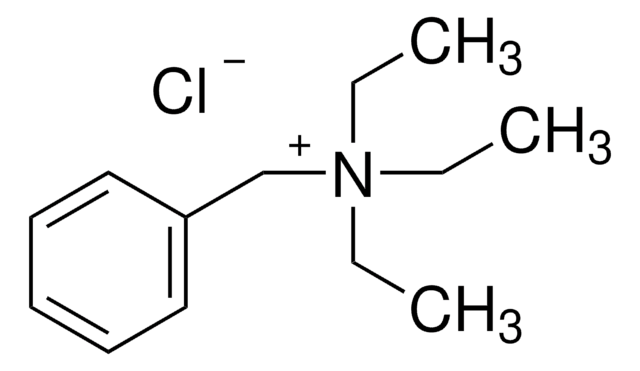234451
1-Bromohexadecane
97%
Synonym(s):
Cetyl bromide, Hexadecyl bromide
Sign Into View Organizational & Contract Pricing
All Photos(2)
About This Item
Linear Formula:
CH3(CH2)15Br
CAS Number:
Molecular Weight:
305.34
Beilstein:
773989
EC Number:
MDL number:
UNSPSC Code:
12352100
PubChem Substance ID:
NACRES:
NA.22
Recommended Products
vapor density
10.6 (vs air)
Quality Level
vapor pressure
<1 mmHg ( 20 °C)
Assay
97%
refractive index
n20/D 1.461 (lit.)
bp
190 °C/11 mmHg (lit.)
mp
16-18 °C (lit.)
density
0.999 g/mL at 25 °C (lit.)
functional group
alkyl halide
bromo
SMILES string
CCCCCCCCCCCCCCCCBr
InChI
1S/C16H33Br/c1-2-3-4-5-6-7-8-9-10-11-12-13-14-15-16-17/h2-16H2,1H3
InChI key
HNTGIJLWHDPAFN-UHFFFAOYSA-N
Looking for similar products? Visit Product Comparison Guide
Related Categories
Application
1-Bromohexadecane has been used:
- in the preparation of soluble carbon nano-onions by covalent functionalization with hexadecyl chains
- as extraction solvent in determination of endocrine-disrupting phenols (EDPs) in water samples by ultrasound-assisted emulsification microextraction (MS-USAEME) method
- in the preparation of [2-(methacryloyloxy)ethyl]dimethylhexadecylammonium bromide monomer, required for the synthesis of novel methacrylate based adsorbents
- in the synthesis of surfactant, N-hexadecyl ethylenediamine triacetic acid (HED3A)
Signal Word
Warning
Hazard Statements
Precautionary Statements
Hazard Classifications
Skin Irrit. 2
Storage Class Code
10 - Combustible liquids
WGK
WGK 3
Flash Point(F)
350.6 °F - closed cup
Flash Point(C)
177 °C - closed cup
Personal Protective Equipment
dust mask type N95 (US), Eyeshields, Gloves
Choose from one of the most recent versions:
Already Own This Product?
Find documentation for the products that you have recently purchased in the Document Library.
Customers Also Viewed
Ming-Wei Shu et al.
The Analyst, 137(9), 2143-2150 (2012-03-03)
Manual shaking-enhanced, ultrasound-assisted emulsification microextraction (MS-USAEME) combined with ultraperformance liquid chromatography (UPLC) with UV detection has been developed for the determination of five endocrine-disrupting phenols (EDPs) in seawater samples and detergent samples: 4-tert-butylphenol (4-t-BP), 4-cumylphenol (4-CP), 4-tert-octylphenol (4-t-OP), 2,4-di-tert-butylphenol (2,4-di-t-BP)
Agustín Molina-Ontoria et al.
Chemical communications (Cambridge, England), 49(24), 2406-2408 (2013-02-16)
Herein we report the preparation of truly soluble CNOs by covalent functionalization with hexadecyl chains. These compounds are prepared in two steps: first, reduction of CNOs with a Na-K alloy in 1,2-DME under vacuum, followed by nucleophilic substitution employing 1-bromohexadecane.
Xixin Wang et al.
Journal of colloid and interface science, 279(2), 548-551 (2004-10-07)
A new kind of surfactant named N-hexadecyl ethylenediamine triacetic acid (HED3A) was synthesized from anhydrous ethylenediamine, 1-bromohexadecane, and chloroacetic acid. Testing showed stability of HED3A in hard water, wetting power, dispersing power, and surface tension increased along with pH value.
Andreas Håkansson et al.
Journal of colloid and interface science, 374(1), 25-33 (2012-03-01)
The Oil Transfer Technique (OTT) was developed by Taisne et al. [1] to measure coalescence during emulsification and has been applied since in several studies. One of the main drawbacks of this technique is that it only gives a qualitative
Paul D Siegel et al.
Toxicological sciences : an official journal of the Society of Toxicology, 107(1), 78-84 (2008-10-22)
The murine local lymph node assay (LLNA) is an internationally accepted assay for identification of contact allergens. The LLNA has also been used in research studies to evaluate contact allergen potency, as well as chemical structural-allergenic activity relationships. The 1-bromoalkanes
Our team of scientists has experience in all areas of research including Life Science, Material Science, Chemical Synthesis, Chromatography, Analytical and many others.
Contact Technical Service












